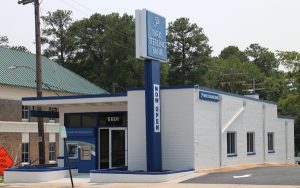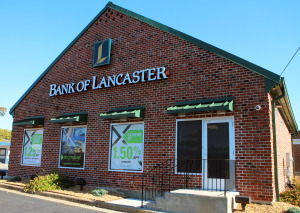
New banking arrival TowneBank secured the financing deal for the Ukrop family’s highly anticipated Quirk hotel downtown. Photos by Michael Schwartz.
The announcement last month that yet another out-of-town bank – in this case Cincinnati-based Fifth Third Bank – was setting up shop in Richmond has become a familiar refrain in the local finance scene.
More than half a dozen newcomer institutions have arrived in Richmond in recent years, all in search of new pools of revenue, particularly for commercial accounts.
It’s a tune that’s been repeated so often lately that the term “overbanked” has been increasingly tossed around town and recently caused some local bankers to question whether there are too many banks vying for too little business in Richmond, all chasing the same loans and the same deposits.
And while the trend appears to be creating a favorable environment for borrowers and depositors, other Richmond bankers worry about the bigger picture – whether the heightened competition may be rekindling some of the more aggressive and riskier levels of pricing and lending exuberance that haven’t been seen since prior to the recession, particularly for commercial lending.
Gaylon Layfield, CEO of Richmond-based Xenith Bank, was one of the first of his local peers to speak out publicly on the issue when he addressed the “sharp increase” in competition in Xenith’s second-quarter earnings release last month.
“There are several new entrants to the Richmond market and while all bankers like to blame each other for irrational pricing and terms, we have simply chosen not to proceed with some opportunities where the returns were substantially below our required returns,” Layfield said in the release, marking his bank’s most profitable first half of a year since its inception.
“In the short term, it’s difficult to say no to a credit-worthy borrower, however the banking business is best practiced when all stakeholders take a longer term view of the business and resist following the herd.”
Layfield explained it more casually in a recent interview: “It is banks that are on the backside of a downturn, anxious to find new opportunities for growth – and growth is limited,” he said. “So banks are just fighting tooth and nail for whatever good business is out there.”
The competition is extra fierce for commercial loans, whether it’s borrowers looking to fund apartment projects, owner-occupied commercial buildings, business expansions or new equipment.
For every 20 potential loan deals Xenith is looking at, Layfield said, “I’d say there’s one that wasn’t highly competitive.”
The rise in competition and the need for some of the newer banks in town to build relationships with established Richmond borrowers is leading to pricing and terms on some loans that Layfield said have given him pause when he’s seen them in the market.
“I think we’re right back doing the same thing all over again as an industry,” he said. “It’s surprising how quickly as bankers we seem to have forgotten the lessons of the last time.”
Billy Beale, CEO of Richmond-based Union Bank & Trust, echoes much of Layfield’s comments and said he’s noticed the trend locally and elsewhere. Union has seen an influx of out-of-town competitors in Fredericksburg, where the bank is also one of the dominant brands. Banks from Maryland, North Carolina and Roanoke have all opened operations there.
“I’ve said in some of our presentations that we have too many banks chasing too few deals,” Beale said, with the caveat that he’s not seeing a repeat of what he calls hyper-activity. “The economy just is not robust enough to provide enough business for everybody to be satisfied.”
Beale said it’s the free enterprise system at work and has led to a “customers market.”
“Those looking to invest in something and need debt – for a commercial building or business expansion – they will not have any trouble finding more than one bank, likely more than three, to make them serious offers,” Beale said.
But he, too, worries about the long-term pressure the increased competition might put on banks as they are pricing loans.
“Customers are seeing more attractive rates than they probably should see in this environment,” he said.
To win commercial business, local bankers said in recent interviews that some competitors are lending at lower rates, longer terms and writing in more aggressive loan covenants, more favorable loan-to-value ratios and lowering the guarantee requirements.
“We’ve seen some crazy terms,” Beale said of competitors. “But sometimes it’s all a matter of perspective.”
That perspective looks different from the view of some of the non-incumbent banks that have settled into Richmond in recent years. And nowhere is their rush more evident than the stretch of Patterson Avenue headed east from the corner of Libbie Avenue in the West End.
There, new arrivals Bank of Lancaster, Park Sterling Bank and Chesapeake Bank have all staked claims with new, highly visible branches. They dot the street in succession.
For Park Sterling, headquartered in Charlotte and run by veteran Richmond banker Jim Cherry, visibility has been a key to its early drive into the local market.
Just as important as its bright blue branch sign on Patterson, the “Financing provided by Park Sterling” signs on real estate projects around town help fuel the bank’s reputation as it looks to build its brand here, Cherry said.
“If you’ve got 50 projects in Richmond, you’ve got 50 billboards,” he said.
That strategy at times comes with more aggressive pricing, at least in the short term, to win the business of established local borrowers and depositors. The move has so far led to Park Sterling scoring such loans on new additions to the Reynolds Crossing development, among others, giving it a relationship with a powerful Richmond family at a stable, highly visible real estate project.
“It may be less expensive to come down a bit on price to build a relationship and gain visibility,” Cherry said. “In this case, I get both a billboard and loan.”
Park Sterling has also been experimenting with more aggressive deposit rates for its initial push here. Cherry said the bank has offered high yield money market accounts that pay 1 percent and go up to 1.3 percent for customers who also open a checking account. Richmond is the only market in which it has such a promotion.
“It’s one of the ways we are going to let people know we’re there,” Cherry said. “We could spend that money on branches. We thought, ‘Well maybe they’d rather have that in their pocket.’
“Some may be saying, ‘Park Sterling must be desperate,’” Cherry said. “It’s just another way of spending the money.”
A few doors down on Patterson, Bank of Lancaster has been promoting its deposit rates with bright window displays at its coveted branch at the corner of Libbie.
That move, too, has appeared to pay off: Lancaster CEO Randy Greene said in the 18 months or so that his institution has been taking deposits in Richmond, the local market now accounts for 17 percent of the bank’s total deposits.
“We’ve been very pleased with our decision,” Greene said.
That’s not to say the locally based banks are suffering. The first half of the year was a stable one, according to the recent financials for local banks, with loan portfolios growing largely across the board of the dozen or so headquartered around the area.
And if they don’t like the idea of competing on overly aggressive pricing, local banks also have at least one other leg up on the newcomers, Beale said.
“There is power in incumbency,” he said.
For the long-term, Beale wonders what could happen if commercial borrowers are too enticed by the relatively cheap money that’s becoming available.
So, for example, if interest rates rise as expected and commercial loans mature, will that business borrower be able to factor in those potential higher costs in the future?
“Will landlords be able to increase rents, can you increase prices to customers to cover an increased line of equipment credit?” Beale asked. “That could lead to the economics of the investment being made today maybe not looking as good three years from now.”
While Layfield said this wave of increased competition isn’t unprecedented in the industry – he said he’s seen it before following downturns – the risk factor, as he sees it, is that history tends to repeat itself.
“Lending tends to dry up and banks are always hoping for and looking toward the economy getting better and businesses looking to expand,” he said. “As those cycles occur over and over again, the industry is entirely capable of being its own worst enemy.
“It has a propensity to overreach.”

New banking arrival TowneBank secured the financing deal for the Ukrop family’s highly anticipated Quirk hotel downtown. Photos by Michael Schwartz.
The announcement last month that yet another out-of-town bank – in this case Cincinnati-based Fifth Third Bank – was setting up shop in Richmond has become a familiar refrain in the local finance scene.
More than half a dozen newcomer institutions have arrived in Richmond in recent years, all in search of new pools of revenue, particularly for commercial accounts.
It’s a tune that’s been repeated so often lately that the term “overbanked” has been increasingly tossed around town and recently caused some local bankers to question whether there are too many banks vying for too little business in Richmond, all chasing the same loans and the same deposits.
And while the trend appears to be creating a favorable environment for borrowers and depositors, other Richmond bankers worry about the bigger picture – whether the heightened competition may be rekindling some of the more aggressive and riskier levels of pricing and lending exuberance that haven’t been seen since prior to the recession, particularly for commercial lending.
Gaylon Layfield, CEO of Richmond-based Xenith Bank, was one of the first of his local peers to speak out publicly on the issue when he addressed the “sharp increase” in competition in Xenith’s second-quarter earnings release last month.
“There are several new entrants to the Richmond market and while all bankers like to blame each other for irrational pricing and terms, we have simply chosen not to proceed with some opportunities where the returns were substantially below our required returns,” Layfield said in the release, marking his bank’s most profitable first half of a year since its inception.
“In the short term, it’s difficult to say no to a credit-worthy borrower, however the banking business is best practiced when all stakeholders take a longer term view of the business and resist following the herd.”
Layfield explained it more casually in a recent interview: “It is banks that are on the backside of a downturn, anxious to find new opportunities for growth – and growth is limited,” he said. “So banks are just fighting tooth and nail for whatever good business is out there.”
The competition is extra fierce for commercial loans, whether it’s borrowers looking to fund apartment projects, owner-occupied commercial buildings, business expansions or new equipment.
For every 20 potential loan deals Xenith is looking at, Layfield said, “I’d say there’s one that wasn’t highly competitive.”
The rise in competition and the need for some of the newer banks in town to build relationships with established Richmond borrowers is leading to pricing and terms on some loans that Layfield said have given him pause when he’s seen them in the market.
“I think we’re right back doing the same thing all over again as an industry,” he said. “It’s surprising how quickly as bankers we seem to have forgotten the lessons of the last time.”
Billy Beale, CEO of Richmond-based Union Bank & Trust, echoes much of Layfield’s comments and said he’s noticed the trend locally and elsewhere. Union has seen an influx of out-of-town competitors in Fredericksburg, where the bank is also one of the dominant brands. Banks from Maryland, North Carolina and Roanoke have all opened operations there.
“I’ve said in some of our presentations that we have too many banks chasing too few deals,” Beale said, with the caveat that he’s not seeing a repeat of what he calls hyper-activity. “The economy just is not robust enough to provide enough business for everybody to be satisfied.”
Beale said it’s the free enterprise system at work and has led to a “customers market.”
“Those looking to invest in something and need debt – for a commercial building or business expansion – they will not have any trouble finding more than one bank, likely more than three, to make them serious offers,” Beale said.
But he, too, worries about the long-term pressure the increased competition might put on banks as they are pricing loans.
“Customers are seeing more attractive rates than they probably should see in this environment,” he said.
To win commercial business, local bankers said in recent interviews that some competitors are lending at lower rates, longer terms and writing in more aggressive loan covenants, more favorable loan-to-value ratios and lowering the guarantee requirements.
“We’ve seen some crazy terms,” Beale said of competitors. “But sometimes it’s all a matter of perspective.”
That perspective looks different from the view of some of the non-incumbent banks that have settled into Richmond in recent years. And nowhere is their rush more evident than the stretch of Patterson Avenue headed east from the corner of Libbie Avenue in the West End.
There, new arrivals Bank of Lancaster, Park Sterling Bank and Chesapeake Bank have all staked claims with new, highly visible branches. They dot the street in succession.
For Park Sterling, headquartered in Charlotte and run by veteran Richmond banker Jim Cherry, visibility has been a key to its early drive into the local market.
Just as important as its bright blue branch sign on Patterson, the “Financing provided by Park Sterling” signs on real estate projects around town help fuel the bank’s reputation as it looks to build its brand here, Cherry said.
“If you’ve got 50 projects in Richmond, you’ve got 50 billboards,” he said.
That strategy at times comes with more aggressive pricing, at least in the short term, to win the business of established local borrowers and depositors. The move has so far led to Park Sterling scoring such loans on new additions to the Reynolds Crossing development, among others, giving it a relationship with a powerful Richmond family at a stable, highly visible real estate project.
“It may be less expensive to come down a bit on price to build a relationship and gain visibility,” Cherry said. “In this case, I get both a billboard and loan.”
Park Sterling has also been experimenting with more aggressive deposit rates for its initial push here. Cherry said the bank has offered high yield money market accounts that pay 1 percent and go up to 1.3 percent for customers who also open a checking account. Richmond is the only market in which it has such a promotion.
“It’s one of the ways we are going to let people know we’re there,” Cherry said. “We could spend that money on branches. We thought, ‘Well maybe they’d rather have that in their pocket.’
“Some may be saying, ‘Park Sterling must be desperate,’” Cherry said. “It’s just another way of spending the money.”
A few doors down on Patterson, Bank of Lancaster has been promoting its deposit rates with bright window displays at its coveted branch at the corner of Libbie.
That move, too, has appeared to pay off: Lancaster CEO Randy Greene said in the 18 months or so that his institution has been taking deposits in Richmond, the local market now accounts for 17 percent of the bank’s total deposits.
“We’ve been very pleased with our decision,” Greene said.
That’s not to say the locally based banks are suffering. The first half of the year was a stable one, according to the recent financials for local banks, with loan portfolios growing largely across the board of the dozen or so headquartered around the area.
And if they don’t like the idea of competing on overly aggressive pricing, local banks also have at least one other leg up on the newcomers, Beale said.
“There is power in incumbency,” he said.
For the long-term, Beale wonders what could happen if commercial borrowers are too enticed by the relatively cheap money that’s becoming available.
So, for example, if interest rates rise as expected and commercial loans mature, will that business borrower be able to factor in those potential higher costs in the future?
“Will landlords be able to increase rents, can you increase prices to customers to cover an increased line of equipment credit?” Beale asked. “That could lead to the economics of the investment being made today maybe not looking as good three years from now.”
While Layfield said this wave of increased competition isn’t unprecedented in the industry – he said he’s seen it before following downturns – the risk factor, as he sees it, is that history tends to repeat itself.
“Lending tends to dry up and banks are always hoping for and looking toward the economy getting better and businesses looking to expand,” he said. “As those cycles occur over and over again, the industry is entirely capable of being its own worst enemy.
“It has a propensity to overreach.”


